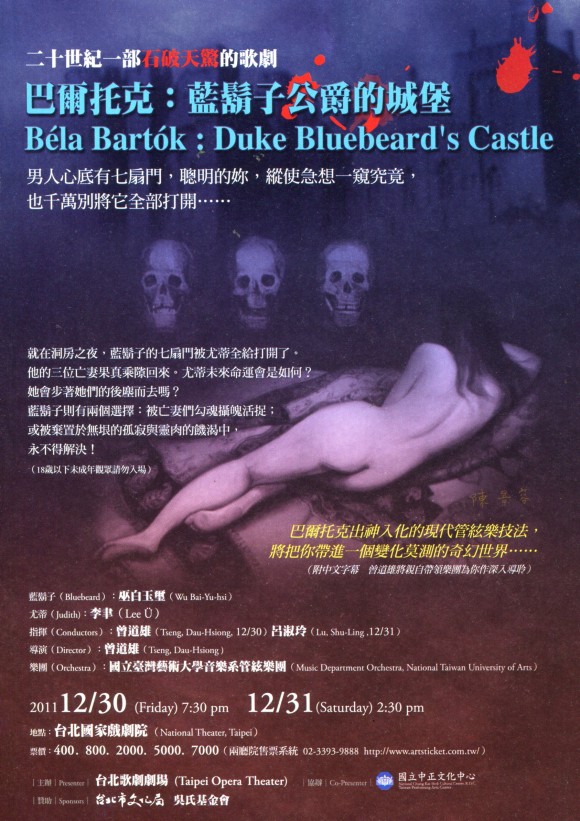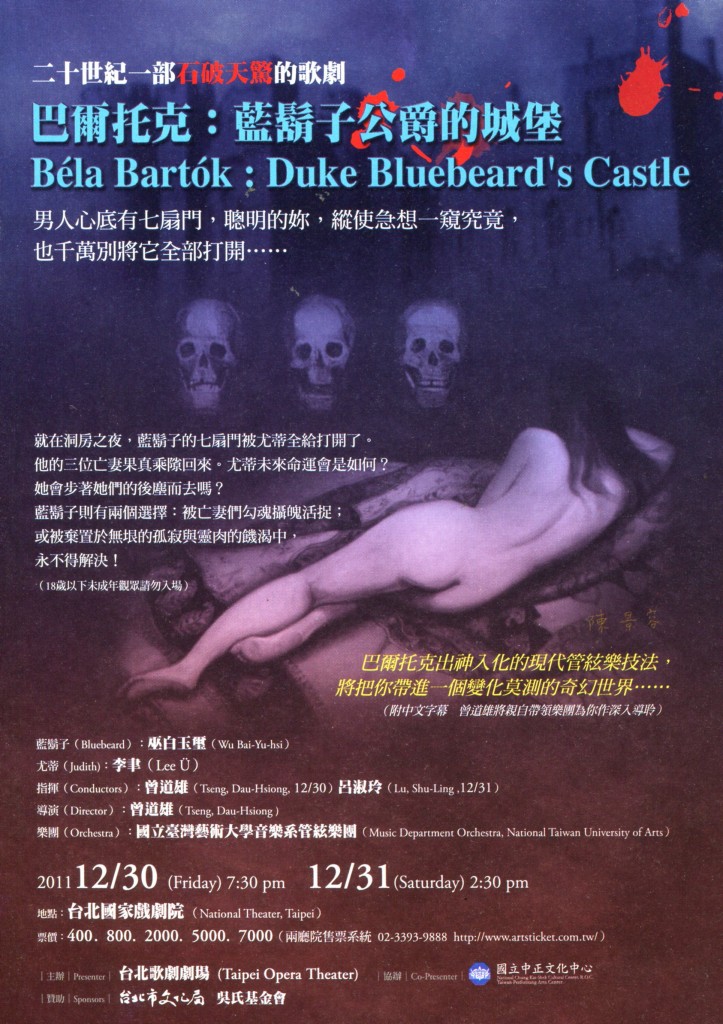Night at the Opera – Bluebeard’s Castle
The opera Bluebeard’s Castle by Hungarian composer Bela Bartok was performed at the National Theater in Taipei on Friday night. I had never been to the National Theater and, on impulse, I picked up a ticket for NT$800. My seat was off to the left in the balcony on the second floor. My experiences at Zhongshan Hall and the National Concert Hall led me to believe that this would be a fine seat. Besides, seats closer to the front and on the main floor rose steadily and quickly in price, topping out at NT$7,000. I can’t believe sitting down there would be nine times better than sitting up where I was. In many ways, sitting up in the balconies is superior, as it gives you a better view of the entire stage and orchestra.
I was very impressed with the National Theater when I walked inside. It looked similar to the National Concert Hall but was that little bit grander. There were three sets of balconies climbing up toward the high ceiling, and there were boxes arrayed along each wall. The boxes were generally quite narrow and had only three or four seats in each one arrayed in a single line. They reminded me for all the world of the floating skiffs that were used in Star Wars: Return of the Jedi when they are out in the desert with Jabba the Hut. I guess I’m still a little kid at heart because I really wanted to have a seat in one of those boxes. They looked kind of fun.
My actual seat was not such a bargain, as it turned out. The rows up there were packed very tightly together and the seats themselves were quite small. It was very awkward and difficult to make my way along the row past other people to get to my seat and then get comfortable. There wasn’t enough room for my legs and I had to constantly shift and move to try to get comfortable. These tight rows and small seats were a particular problem considering the habit of Taiwanese people of showing up late (or on time to the second) for most things. They do not like to appear early. There was a lot of confusion and disruption as people suddenly started rushing in and had to fight their way past lots of people who were already deeply nested in their seats.
I had a good view of the orchestra pit, and I noted that the performers were all quite young. They were, in fact, the Music Department Orchestra from the National Taiwan University of Arts. The conductor for the Friday night performance was Tseng, Dau-Hsiong. I just did the usual Google search for his name, and I came across a very interesting Taipei Times article about the production of Bluebeard’s Castle. From the article, I learned that 2011 is the centennial of the opera, which was written in 1911. The performance last night felt unusual, and in reading this article, I’m beginning to understand why. Apparently, the National Taiwan Symphony Orchestra cancelled the performance. Tseng, Dau-Hsiong thought this was a shame, and since the performance venue had already been booked, he decided to put it on himself. I don’t know what something like that entails (how does one individual “put on” an opera?), but it seems to entail at least paying for it. Tseng could not get any funding, and he paid for it with a cash prize he had won from the National Award for Arts. The article says that there was still a shortfall of NT$3.6 million. Apparently, the NT$800 I had paid for my ticket does not go very far in terms of paying for an opera. The article does not say how that shortfall was dealt with.
In any case, this performance was Tseng’s baby, and he decided to open it with an hour-long seminar on the music of the opera. This was something I was not expecting at all, and I found it a trial to sit through. Perhaps if you can understand Chinese, it was fascinating and worthwhile. I can’t say. But for an office-worker such as myself who had just finished roughly nine hours of sitting in an office chair, it was no fun to sit there in my tiny, uncomfortable seat for more than an hour waiting for the actual performance to begin. When you are listening to music or watching an opera, you can lose yourself in it and forget about how much your butt hurts. Just sitting there listening to someone talk is not the same thing, and I found myself getting pretty antsy. Perhaps if I had known this was going to happen, it would have been okay. As it was, I was under the assumption that this conductor was just getting carried away by his introduction and was going on too long – waaaaaay too long. I imagined all the performers backstage pulling their hair out and wondering when this guy was going to wrap it up. I also imagined all the people who had paid NT$7,000 for their seats getting annoyed that they’d paid so much just to sit through a music lecture. However, this was all part of the program and everyone was expecting it. In fact, it went on well over an hour and ended with an intermission. Everyone got up and left the theater. I had this wild moment where I thought that perhaps that was the whole event. Maybe I had purchased a ticket for a music lecture and not an actual opera!
On the positive side, his lecture was punctuated with illustrative samples of music from the orchestra. This gave me a taste of the type of music to come, and I found myself looking forward to hearing it performed in full. I’m no expert. I’d barely even heard of Bartok before I bought a ticket for this opera, but apparently he’s known for a new style of music, one that challenged centuries of normal practice in classical music. I’m sure it’s all intensely technical and complicated, but my impression was that his music was somewhat harsh and jarring and discordant – not necessarily bad things. The music also seemed to be more like a movie score than a typical symphony. That makes sense since the music was meant to accompany the movements and speeches of the actors in the opera. Not to betray my lack of sophistication too much, it put me in mind of Bugs Bunny cartoons, in which the music clearly conveyed the emotions and the actions of the characters. In that way, it was fun.
I’d read the libretto before the performance, so I knew what was going to happen more or less. I just didn’t know how they were going to technically portray the castle, the doors, and the various things that Judith finds behind the doors. In the end, it was done simply but effectively with lots of stagecraft and theater magic. Rather than have physical doors that Judith opens, they projected the doors onto a screen and then projected large images of what was behind each door: the torture chamber, the armory, the treasury, the garden, the kingdom, the water, and then the other wives whether ghosts or still alive. The screen itself could be opaque or transparent depending on whether they wanted to reveal things behind it. The screen was also lifted completely out of the way for certain scenes.
My impression of the opera from reading the libretto was that it was very serious and foreboding. I got no humor from it at all. In actuality, the audience laughed on many occasions. This surprised me a great deal, because I saw nothing funny at all. There were many moments in the libretto where Judith had to persuade Bluebeard to hand over keys to the doors. She used all her powers to do this, including her love for Bluebeard. Bluebeard knew it would lead to tragedy, but he could not resist her and gave her all the keys. In the performance, though, it apparently was quite funny as the audience laughed a lot. The idea behind the humor had to be that Judith was being coquettish with her feminine charms – teasing Bluebeard – embracing him and becoming very passionate and then running away and demanding a key. This was very funny to the audience, but I have no idea whether it was meant to be funny. Not understanding the words, I didn’t find it funny at all. The music didn’t seem to be indicating humor either. I had to wonder if the humor was intended or if it was the result of some cross-cultural confusion.
The ending of the opera was quite dramatic. The three former wives were impressive in their massive crowns and elaborate costumes. Sinister creatures in black robes stood around them waiting to welcome and trap Judith in eternal glory with her own heavy crown and robe. Mist and fog rolled up and obscured the stage and everyone disappeared leaving just a single creature under a black robe. This creature walked forward and dropped the robe to reveal a young woman completely nude. She stood on the stage for perhaps twenty seconds in an elaborate pose before the stage went black to end the performance.
It was a funny moment for me. I had binoculars with me and I had used them all night long to get close-ups of all the performers, the stage, and the orchestra. Now I had a beautiful naked woman on stage. Using the binoculars to get a close-up seemed somehow impolite if not lascivious. The struggle lasted only a short time. Of course, I used the binoculars.
Tags: Bartok, Bela Bartok, Bluebeard's Castle, music, National Theater, NT, opera, Star Wars, Taipei, Taiwan




